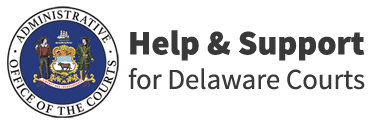Arraignment in the Court of Common Pleas
What is an arraignment?
All prosecutions are brought on behalf of the State of Delaware (the "State") and the individual charged with the motor vehicle offense(s) or criminal charge(s) is the defendant.
An arraignment is the defendant's initial appearance before the Court. At the arraignment, the defendant will be informed of the charges against him/her. The defendant or his/her attorney will be given a copy of the Information with the charges set forth on it as filed by the Attorney General of the State, and will be advised of the right to a trial by a judge or by jury.
The Deputy Attorney General may offer the defendant a plea bargain, but he/she is under no obligation to accept the offer. The defendant will be asked to enter a plea of guilty or not guilty. The defendant is presumed to be innocent unless, and until, the State proves his/her guilt beyond a reasonable doubt. When a reasonable doubt exists, the case will be decided in the defendant's favor.
If the defendant wishes to enter a plea of guilty, he/she is admitting that they committed the offense with which they are charged. The defendant is also giving up the right to a trial and the right to remain silent. Before accepting the guilty plea, the defendant must complete a guilty plea form and the judicial officer may question the defendant to make sure that he/she understands the consequences of the plea, and that the plea is being made freely and not because he/she is afraid of pleading "not guilty." If the defendant believes he/she has not violated the law or has a defense to the charge, he/she should plead not guilty. If in doubt, the defendant should plead not guilty. The defendant is not given a heavier sentence if convicted at trial after a not guilty plea.
If the defendant wishes to enter a plea of guilty and the judicial officer accepts the plea; the next step is sentencing. The judicial officer may decide to immediately sentence the defendant, or may schedule the sentencing for another day after ordering a presentence report.
If the defendant wishes to enter a plea of not guilty at arraignment, the clerk will schedule the case for trial by a judge or by jury depending on what the defendant chooses. Even though the defendant has pleaded not guilty at arraignment, he/she is permitted to plead guilty at any time prior to trial.
If the defendant does not wish to be arraigned in open Court and wishes to plead not guilty, he/she may file a Prior Plea Form, which may be obtained from the Clerk of the Court or from an attorney.
Prior Plea Agreement
Complete the Prior Plea Agreement form to enter a NOT GUILTY plea to the charge(s) without appearing in Court for arraignment.
What is bail?
Bail is the amount of money a defendant must post to be released from custody until their trial is heard. The purpose of bail is to ensure the defendant's appearance at all court trials and hearings. Once the defendant's trial has concluded, the bail is returned to the individual who posted it. If the defendant fails to appear, he/she risks having the bail forfeited.
The judicial officer will weigh many factors when deciding the amount of bail. Some of these factors include the risk of flight by the defendant, the type of alleged crime, how long the defendant has lived in Delaware, the safety of the community and the defendant's criminal history (if any). Bail may be imposed with certain conditions, such as, a no contact order with the alleged victim in the case.
Types of bail:
Own Recognizance BailThe judicial officer may release a defendant on his/her own recognizance, also known as "OR" bail. The defendant is not required to pay any money, but must sign a bond guaranteeing their appearance for future court appearances.
Unsecured BailIf a judicial officer imposes an unsecured bond, the defendant must sign a bond guaranteeing his/her appearance for future court appearances. If the defendant does not appear, the Court will require the defendant to pay a designated amount of money.
Secured BailThe defendant must pay the Court a designated amount of money or post security in the amount of the bail in order to be released. This security can be in the form of cash or property and may be posted by the defendant or by someone on his/her behalf, e.g., a relative or a bail bondsman.
Cash OnlyThe defendant, or someone on his/her behalf, must pay the Court a designated amount of money in order to be released. The defendant, and the co-signer, if any, must sign the bond that guarantees the defendant's appearance at future court appearances.
What is plea bargaining?
A plea bargain is a negotiated agreement between the defendant and the Deputy Attorney General on behalf of the State to dispose of a criminal case. It often involves the defendant agreeing to plead guilty to lesser charges, or a guilty plea to some of the charges in exchange for other charges being dropped. When a charge is dropped by the State, the Deputy Attorney General will enter a nolle prosequi in the case, meaning that the State is choosing not to prosecute the charge at this time. It may also involve the defendant agreeing to plead guilty as charged, with the prosecution recommending leniency to the sentencing judge. The Court is not involved in negotiating the plea bargain, other than the judge accepting the plea when it is offered.
The purpose of plea bargaining is to save the time of going to trial. The Court is also saved the burden of conducting a trial on each defendant before the Court. The defendant may wish to save the cost of defending himself/herself at trial, and the risk of a harsher punishment if convicted as originally charged.

